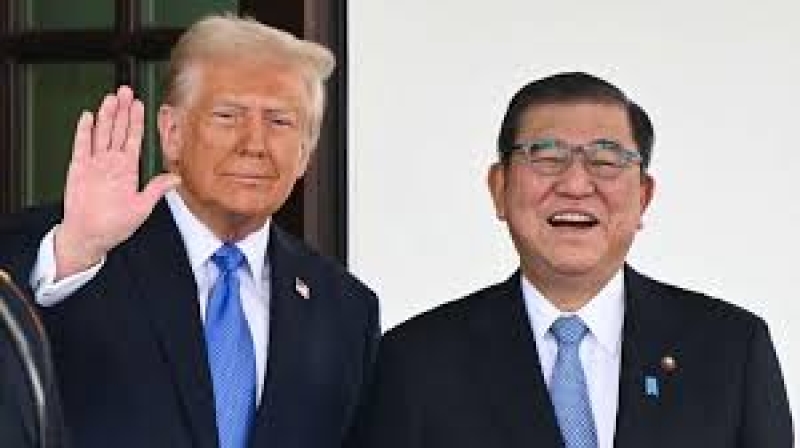- Puppet show enchants Children as Boi Mela comes alive on day 2 |
- DSCC Admin Salam’s drive to make South Dhaka a ‘clean city’ |
- 274 Taliban Dead, 55 Pakistan Troops Killed |
- Now 'open war' with Afghanistan after latest strikes |
- Dhaka's air quality fourth worst in world on Friday morning |
Trump announces 'massive' Japan trade deal

US President Donald Trump has announced a "massive" trade deal with Japan, as China said it will send its vice premier to US trade talks next week to secure its own agreement ahead of a looming deadline.
In an attempt to slash his country's colossal trade deficit, the US president has vowed to hit dozens of countries with punitive "reciprocal" tariffs if they do not hammer out a pact with Washington by August 1.
The Japan agreement, along with another pact with the Philippines also announced on Tuesday, means Trump has now secured five agreements since his administration promised in April "90 deals in 90 days."
The others are with Britain, Vietnam and Indonesia, which the White House said Tuesday would ease critical mineral export restrictions.
Negotiations are still ongoing with much larger US trading partners China, Canada, Mexico and the European Union.
Representatives from China and the United States will meet next week in the Swedish capital Stockholm to try and hammer out a deal before an August 12 deadline agreed in May.
As the clock ticks down, China said Wednesday it will seek to "strengthen cooperation" with Washington at the talks, and confirmed vice premier He Lifeng would attend.
- Japan deal -
"We just completed a massive Deal with Japan, perhaps the largest Deal ever made," Trump wrote on his Truth Social platform on Tuesday.
He said that under the deal, "Japan will invest, at my direction, $550 Billion Dollars into the United States, which will receive 90% of the Profits".
He did not provide further details on the unusual investment plan, but said it "will create Hundreds of Thousands of Jobs".
Japanese exports to the United States were already subject to a 10 percent tariff, which would have risen to 25 percent on August 1 without a deal.
Duties of 25 percent on Japanese autos -- an industry accounting for eight percent of Japanese jobs -- were also already in place, plus 50 percent on steel and aluminum.
Japanese Prime Minister Shigeru Ishiba said that the autos levy had now been cut to 15 percent, sending Japanese car stocks soaring, with Toyota and Mitsubishi up around 14 percent each. The Nikkei rose 3.5 percent.
"We are the first (country) in the world to reduce tariffs on automobiles and auto parts, with no limits on volume," he told reporters.
"By protecting what needs to be protected, we continued the negotiations with an aim to reach an agreement that meets the national interest of both Japan and the United States," Ishiba added.
- Rice imports -
However, Japan's trade envoy Ryosei Akazawa, who secured the deal on his eighth visit to Washington, said the 50 percent tariffs on steel and aluminum would remain.
Akazawa also said increased defense spending by Japan -- something Trump has pressed for -- was not part of the agreement.
Trump said Tuesday Japan has also agreed to "open their Country to Trade including Cars and Trucks, Rice and certain other Agricultural Products, and other things."
Rice imports are a sensitive issue in Japan, and Ishiba's government -- which lost its upper house majority in elections on Sunday -- had previously ruled out any concessions.
Japan currently imports 770,000 tons of rice tariff-free under its World Trade Organization commitments, and Ishiba said it would import more US grain within this.
Ishiba said Wednesday that the deal does not "sacrifice" Japan's agricultural sector.
Tatsuo Yasunaga, the chair of Japan Foreign Trade Council, welcomed the trade deal announcement but said the business community needed to see details to assess its impact.
"I highly commend the fact that this major milestone has been achieved and dispelled the uncertainty that private companies had been concerned about," Yasunaga said.
Naomi Omura, an 80-year-old voter, said it was "disappointing that Japan cannot act more strongly" towards the United States.
Tetsuo Momiyama, 81, said that Ishiba "is finished... It's good timing for him to go."
Reports claimed Wednesday that he aims to step down soon following the election debacle.
- Eyes on the prize -
Other major US trading partners are watching closely as the end of the month approaches.
The Philippines' deal also announced Tuesday only saw levies cut by one percentage point, to 19 percent, after Trump hosted President Ferdinand Marcos.
China on Wednesday said it supported "equal dialogue" following the announcement of the Japan-US deal.
Beijing and Washington imposed escalating, tit-for-tat levies on each other's exports earlier this year, reaching triple-digit levels.
But in talks in Geneva in May they agreed to lower them temporarily until August 12, reports BSS.

